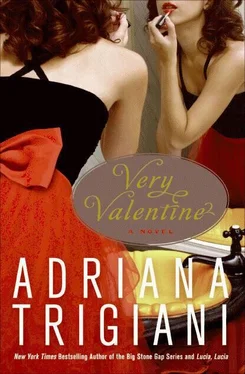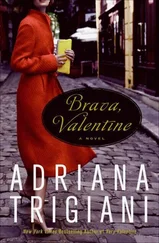“Are you hungry?” Roman asks.
“Yeah.”
“My favorite kind of woman. A hungry one.” He smiles. He helps me take off my coat, which I place on a rolling stool next to the door and anchor with my purse.
“There’s an apron on the hook.”
“I have to work for my supper?”
“That’s the rule.”
Behind me, sure enough, there’s a clean white apron. I pull it over my head; it has the scent of bleach and has been pressed with starch. Roman reaches around me and crosses the strings in the back then reaches around to the front of my waist, tying the ends in a tight bow. Then he pats my hips. I could have done without the hip patting, but it’s too late. I’m here and he’s patting. “Go with it,” I tell myself. Roman places a large wooden spoon in my hand.
“Stir.” He points to a large pot on a low flame. Inside, a mound of soft, golden risotto glistens, a fragrant mist of sweet butter, cream, and saffron rising from the pot. “And don’t stop.”
The soles of my sandals stick to the matting on the floor, a series of open rubber rectangular sheets placed around the work areas.
Roman drops to one knee and unties the ribbons on my evening sandals, silver calfskin in a gladiator style with flat white ribbons that lace up past my ankle. As he slips the sandal off my foot, the warmth of his hand sends a chill up my spine.
“Nice shoes.” He stands.
“Thanks. I made them.”
“Here.” He pulls a pair of red plastic clogs like his own from under the island. “Wear these. I didn’t make them.” Then he removes my left sandal and slips on the other clog, just like the prince in Cinderella.
I take a step in them. “I’m a delicate size nine. What are these? Fifteens?”
“Twelve and a half. But you don’t have to do a lot of walking in them. You’ll be stirring for the duration.” He takes my shoes and dangles them on the hook where the aprons go. “I’ll be right back,” he says and goes out into the restaurant.
As I stir, I look down at my feet, which now remind me of the feet of the kid on the Dutch Boy paint billboard in Sunnyside, Queens. They also remind me of my father’s big shoes, which I used to wear when I was a little girl. I’d stomp around in them, pretending to be all grown up.
Now that I’m alone, I give the kitchen a real once-over. My eyes travel up over the sink to a framed picture of a naked woman in profile, with huge hooters, leaning against a pile of dirty dishes. She winks at me. The caption reads: A WOMAN’S WORK IS NEVER DONE.
“That’s Bruna,” Roman says from behind me.
“That’s quite a stack of dishes.”
“She’s the patron saint of kitchens.”
“And chefs?” I’ll keep my eyes on the risotto from now on.
He takes the spoon from me. “So, why did you decide to call me?”
“You asked me, and I have excellent manners, so I did.”
“I don’t think that’s it.” He puts a tiny amount of salt in his hand and sprinkles it into the pot. “I think you might like me a little.”
“I’ll be able to tell you for sure after I taste your cooking.”
“Fair enough.” Roman shakes his head and grins.
The busboy enters from the restaurant with a large pan of dirty dishes. He places them in the sink. They converse in Spanish as Roman reaches into his pocket and gives him several twenty-dollar bills. The busboy thanks him, peels off his apron, and goes.
“Roberto has another job, at another restaurant,” Roman explains. “Someday he’ll have his own. I started out washing dishes, too.”
“How many employees do you have?”
“Three full-time, me, the sous-chef and the bartender. Three part-time, the busboy and two waiters. The restaurant seats only forty-five, but we’re booked up every night. You must know what it’s like, running a small business in New York City. You’re never off the clock. Even when I don’t have a room full of customers, there’s prep, or I’m up early going to the markets, or I’m here, working on additions to the menu.” As Roman stirs the risotto, I notice how clean his hands are and how neatly his nails are filed. “And it’s an expensive business. Some days, I feel like I’m just getting by.”
I move to the sink and turn my back on Bruna. “You must be doing a little better than getting by. You were looking at an apartment in the Richard Meier building.”
“The broker was showing me a potential restaurant space on the street level. Then she offered to show me an apartment.” He smiles. “I was curious. That’s when I saw you.” Roman takes the spoon from me and stirs the risotto. “That’s some building your grandmother owns.”
“We know.”
The bartender, wearing a coat and hat, leans in the doorway. “I’m leaving.”
“Thanks, Celeste. Say hello to Valentine.”
“Nice to meet you,” she says and goes.
“She’s lovely.”
“She’s married.”
“That’s nice.” Interesting. Roman makes a point that his pretty bartender is married.
“You’re a fan of marriage?”
“Good ones.” I slip up onto the clean work counter next to the sink. “How about you?”
“Not a fan,” he says.
“At least you’re honest.”
“Have you been married?” he asks.
“No. Have you?”
“Yes.”
“Do you have children?”
“No.” He smiles.
“I hope you don’t mind that I ask questions like a census taker.”
He laughs. “You have an unusual style.”
“I’m not going for style. If I were, I would have discounted you when I saw you in the Campari T-shirt and the striped shorts that looked like the pantaloons the security guards wear at the Vatican.”
“Oh, so you have something against bright colors.”
“Not really. I just like to see a man wearing something besides action wear.”
Roman grates a wedge of aged parmesan over the risotto. “And, if memory serves, your outfit that night was spectacular.”
I turn the color of Saint Bruna’s ruby red stilettos.
He laughs. “Now why should you be embarrassed?”
“If I saw you naked on a roof, I’d pretend I hadn’t. That’s just good manners.”
“Fair enough. But let’s say I met you on the street and you were wearing a lovely dress like the one you have on tonight. Don’t suppose I wouldn’t be imagining what you’d look like without it. So I’d say we’ve just skipped a step.”
“I don’t skip steps. In fact…,” I blurt out, “I don’t go out with Italians.”
He puts the spoon down and takes the bottom of his apron, and using it as hot pads, lifts the pot off the stove.
“May I ask why not?”
“The cheating.”
He throws his head back and laughs. “You’re kidding. You dismiss an entire group of men for something they haven’t done but you think they might do? That’s completely prejudiced.”
“I’m a believer in DNA. But let me explain this on a culinary level. About ten years ago, there were all these articles about soy. Eat soy, drink soy, and stop eating dairy foods because they’ll kill you. So I stopped eating regular cheese and milk and ate the soy stuff. Well, it made me sick but I persisted because everything I read said soy was good for me, even though my body was telling me it wasn’t. When I told Gram about it and she said, ‘At no point in our history did Italians ever consume soy. Cheese and tomatoes and cream and butter and pasta have been in our diet for centuries. We thrive on it. Get rid of the soy.’ And I did. When I started eating the food of my forefathers again, I felt like a million bucks.”
“What does that have to do with dating Italian men?”
“The same principle applies. Italian men have built thousands of years of romantic history on the notion of the Madonna and the whore. They marry the Madonna and they have fun with the whore. You’d have to go back to the Etruscans, with Dr. Phil in tow, to change the way Italian men think. And I say it is impossible to change the fundamental nature of our people, in particular the nature of our men. The risotto is done.”
Читать дальше












